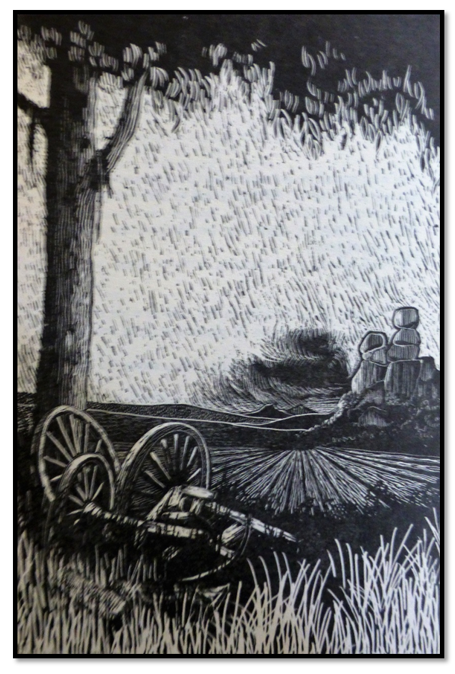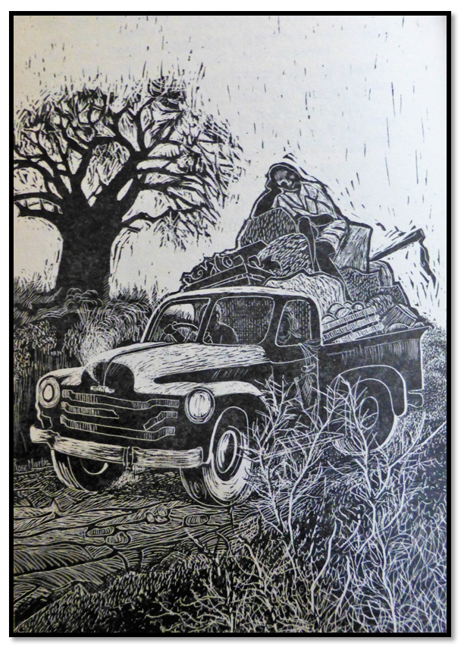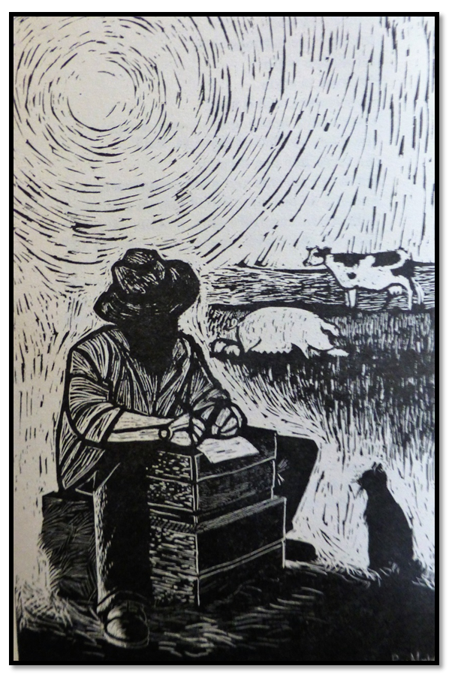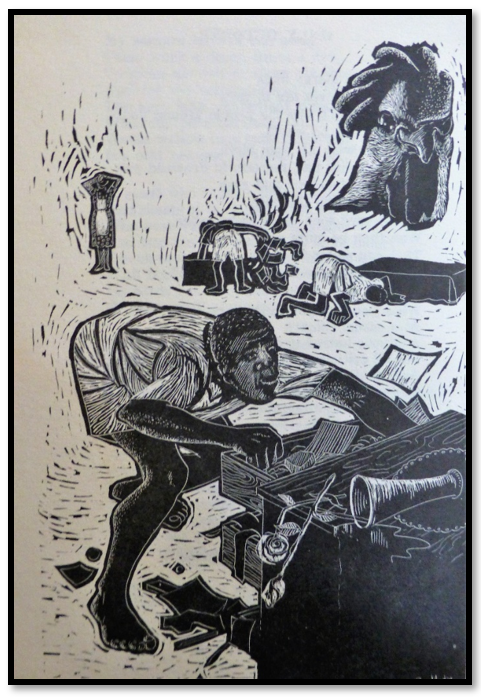Next year will be better and the verse of ‘T’
Hylda Richards and her husband Tom farmed in Kent before the tobacco boom of the mid 1920’s lured them to Southern Rhodesia (now Zimbabwe) In 1928 they settled on Tavydale Farm in the Mazoe Valley, but the market for tobacco had become oversupplied, prices were rock-bottom as commodity prices collapsed and the entire farming industry was in trouble. There followed years of unrelieved financial struggle through the Great Depression from 1929 to 1939 which she tells in her book Next Year Will Be Better. In his foreword to The Verse of T, W.D. Gale says the farmers’ as a community were generally up against the odds during the 1930’s and 1940’s; able to survive only on the credit extended to them, with no one really well off, but equally no one in dire distress. They survived because of their courage, resourcefulness and a cheerful brand of optimism. Hylda Richards became well-known for the poems of ‘T’ (named after Tavydale Farm) which were published in the Rhodesia Herald in the 1930’s and 1940’s and for her book False Dawn which was based on the diaries of Dan and Maynie Judson.
Her poems poke fun at some aspect of the difficulties of rural farming life such as when she lost her keys (N’kosikas’s keys) and when the servants desert for a beer drink (Lo brudder gamina) and the Farmer’s Bus, so reminiscent of all the old vehicles from the rural districts. They are written in an unassuming style, but they reflect day-to-day life on a Rhodesian farm when farming was often a risky and unrewarding livelihood before the days when tobacco was referred to as ‘the golden leaf.’
Next Year Will Be Better
“The season is over, take courage my dear!”
The farmer exclaims, “Twill be better next year.
My plans for this year were completely upset:
It was always too dry when it wasn’t too wet.
A month of hard drought with the land all athirst
Six inches of rain and the dam-wall that burst.
But next year will be better, next year will be fine,
The rain’s going to rain and the sun’s going to shine!
When weather is normal, we’ll see our way clear
For everything’s going to be better next year.
“Our mealies looked perfect, how could I foretell
We’d get the stalk-borer and witch-weed as well?
Our ‘baccy and ‘taties a wonderful sight,
Til one got the spot and the other the blight.
The hens laid quite well, then the price had to drop
This year we have been a financial flop!”
But next year will be better, next year will be fine,
It’s just our misfortune, your bad luck and mine.
But troubles in farming will disappear
For everything’s going to be better next year.
“This year all our sows were so clumsy and fat
They lay on their piglets and squashed them all flat.
And Fate, I must say, gave a bit of a stab
When the turkeys got roup and the sheep got the scab.
And I was, my darling, most justly annoyed
When the milkers got sick and were duly destroyed!”
But next year will be better, next year will be fine,
It’s no use to grumble, it’s no use to whine.
And now we’ve no dairy, please be of good cheer
For everything’s going to be better next year.
“I know that I promised a washing-machine
But net circumstances were quite unforeseen.
That also applies to your overseas trip.
I must change the tractor and rebuild the dip!
Please don’t look despondent, look cheerful instead
For each of these longed-for delights lie ahead!
But next year will be better, next year will be fine,
And all that we do will just fall into line!
Until then my darling, we’ll be more austere
For everything’s going to be better next year.
The Farmer’s Bus
The farmer’s bus is ready for town,
Is packed and laden and weighted down
With butter and eggs and fruit to sell,
And half a dozen old hens as well
And now she’s ready and waiting for us-
Anyone else for the farmer’s bus?
The farmer’s bus is ready, but oh!
Nothing on earth will make her go;
So out we all get to give her a shove,
Oh, the farmer’s bus is a car we love!
And after some time and a great deal of fuss
We’re able to start in the farmer’s bus.
Away she goes now, she’s off at last,
She may be old, but she goes quite fast;
She feels quite proudish, and well she may
When she races an older car on the way;
But she’s good enough for the likes of us,
So we tear along in the farmer’s bus.
The farmer’s bus has arrived in town,
Her radiator is cooling down;
And now relieved of her heavy load,
She’s peacefully parked on the smooth broad road,
And standing there no embarrassment feels
With her battered hood and her muddy wheels;
And the sleek town cars may look aghast
At a car that boasts such a terrible past;
But she doesn’t care, not a tinker’s cuss-
She’s proud of being a farmer’s bus!
The farmer’s bus is off once more,
Jogging along from store to store,
Collecting a curious assortment of things-
Groceries, petrol and chicken rings;
Some wagon-grease and a box of soap,
A set of discs and a coil of rope;
The empty boxes that held the eggs,
And the weird jumble of arms and legs;
A gramophone record, a window frame,
We’re far more loaded tan when we came!
Save just a little more room for us-
You can’t put more on the farmer’s bus!
She hurries off home, for she hate the dark,
She’s loaded beyond the plimsoll mark;
She boils like fun, yet she’s drunk a lot,
We take off her bonnet because she’s hot;
Yet she brings us all home without any fuss-
Who dares to sneer at the farmer’s bus?
The Farmer’s Love Letter
My darling, since you went away,
I’ve missed you every single day.
This ‘baccy’s curing rather light
I think I did not put the right
Amount of fertilizer, dear.
Oh, how I wish you were here!
My dearest, could you realise
The love which in my bosom lies;
With thoughts of you my mind is filled.
Ten rats were in the store-hut killed.
For you, my sweet, my soul’s athirst;
The abscess on that cow has burst.
I miss the sight of your dear face,
Your form so slim and full of grace.
I’m always wishing you’d appear,
I seem to see you everywhere.
I saw a huge baboon today,
But though I fired it got way.
I have no news, my darling one,
I work all day in hottest sun,
And when I came in from the glare
I hate to find that you’re not there
But far away dear in the town;
Today the black sow farrowed down.
O darling, how I long for you,
Without your presence life is blue.
I feel so very bored with it;
Today I filled the silage pit.
Without you life I can’t endure,
We also spread the kraal manure.
Goodbye my darling, it is noon
And I must sound m’simbe soon,
Oh darling-heart…just half a tick
The cat is going to be sick…
I caught her just in time…I will
Now end with tons of love from Bill.
N’Kosikas’s keys
The house is in confusion, the boys run to and fro,
There’s rummaging in cupboards and there’s hunting high and low;
And what is the excitement and hurry if you please?
The answer is: “They’re looking for N’Kosikas’s keys.”
“Wherever have they got to?” she says with wrinkled brow.
“I left them on the table and they’ve simply vanished now.”
So cook must leave his baking and the houseboy’s on his knees,
A-searching under things to find N’Kosikas’s keys.
She says she can’t explain it, just how they disappear;
Perhaps when she went visiting, she may have left them there;
So hurry, send the picannin at once to Mrs B’s
To ask if she has chanced to find N’Kosikas’s keys.
“Why ever do you want to go and lose the cussed keys?”
N’Kosikas is crying, she doesn’t like to tell,
But now she feels quite certain she dropped them down the well;
And all the while the Broody is sitting at her ease
On thirteen tiny chickens and N’Kosikas’s keys!
Acknowledgements
Hylda Richards. Next Year Will Be Better and the Verse of ‘T’ Books of Rhodesia, Bulawayo 1975
Rose Martin for all the woodcuts




